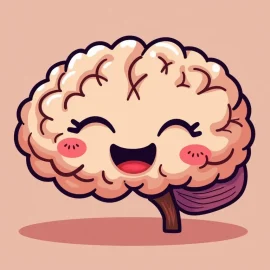

This article is an excerpt from the Shortform book guide to "The Blank Slate" by Steven Pinker. Shortform has the world's best summaries and analyses of books you should be reading.
Like this article? Sign up for a free trial here.
Are male and female brains different? How does this impact our understanding of gender roles in society?
In The Blank Slate, Steven Pinker explores the scientific view of human nature and its implications for gender differences. He argues that genetics play a role in shaping cognitive disparities between men and women, challenging the idea that socialization alone determines these differences.
Keep reading for Pinker’s thought-provoking analysis, and discover how science sheds light on an age-old question.
The Differences Between Male and Female Brains
Are male and female brains different? According to Pinker, the scientific view of human nature sheds light on this hot-button issue. He argues that this account of human nature shows that some differences in men’s and women’s minds have roots in genetics, in contrast with the empiricist idea that gender differences are caused by socialization alone.
(Shortform note: In his book, Pinker largely uses the terms “gender” and “sex” interchangeably. However, it’s widely accepted in health care and other fields that these are distinct terms. “Sex” refers to biological features such as sexual anatomy and chromosomes. Doctors typically assign babies the sex of male, female, or intersex. By contrast, gender is a social construct; biology doesn’t determine it. People’s genders—such as male, female, and nonbinary—are based on their personal experiences as well as social and cultural norms. To align with these definitions, we’ll use terms such as “sex,” “genetically male,” and “genetically female” to refer to “sex,” and we’ll use terms like “female”, “boy,” and “nonbinary” when referring to gender.)
Pinker cites scientific studies refuting the empiricist idea that socialization alone causes gender differences. For example, one study examined 25 genetically male children born without a penis due to a medical condition. They were castrated and brought up as girls. The study found that all of these children exhibited traditionally male characteristics (like roughhousing) and half of them declared themselves boys without knowing of their condition. According to Pinker, if gender differences were caused only by culture, this outcome would be unexpected.
(Shortform note: Other experts point out that, in light of the study Pinker cites, health-care professionals have largely stopped recommending raising genetically male infants (ones with X and Y chromosomes) as females. In particular, while 54% of infants with the condition Pinker describes were raised as females between 1985 and 1992, only 6% were raised as females between 2001 and 2008.)
In practice, Pinker suggests that the gender gap—that many careers have a disproportionately low percentage of women—could have a partially genetic explanation. For example, he notes that the higher percentage of male mathematicians and engineers could be partially due to the fact that, across different cultures, boys tend to have slightly better mathematical and spatial reasoning skills than girls from a young age.
(Shortform note: The idea that men are better at certain skills like math is sometimes used to explain why men’s pay is typically higher than women’s, even for equivalent work. But some experts point out that the differences in math scores between boys and girls in many countries are too small to explain anything but a marginal difference in pay. For instance, in some countries like Moldova and Qatar, a gender pay gap persists despite almost no difference in math test scores between boys and girls.)
Pinker clarifies that such genetically rooted cognitive differences between men and women aren’t evidence of one gender’s superiority. Relatedly, any such differences aren’t grounds for gender discrimination. This takeaway aligns with his argument against empiricism: that discrimination is unjustifiable regardless of whether innate differences exist between people.
(Shortform note: Feminist theorists share Pinker’s opposition to sexism—however, some would likely recommend scrutinizing the research Pinker relied on to arrive at these conclusions. Historian and feminist theorist Donna Haraway argues that what’s often presented as objective, neutral scientific knowledge is influenced by researchers’ identities and biases. She says that scholars can ethically produce knowledge by recognizing their limitations and biases, and we should be skeptical of the work of researchers who fail to do so.)
Applying this takeaway to the world of work, Pinker argues for equality of opportunity in employment—ensuring men and women have access to the same career opportunities—over equality of outcomes, or the idea of basing employment decisions on the goal of proportional representation. Given this, he says, we should focus on supporting policies that make it easier for men and women to thrive in the careers they choose—regardless of whether they choose those careers in equal numbers.
(Shortform note: Pinker’s emphasis on equality of opportunity between men and women overlooks people who fall outside of the gender binary, such as those who are nonbinary, genderfluid, and two-spirit. Policies that focus on the career success of only men and women risk excluding these other genders. How can employers include people who fall outside the gender binary in their equality-of-opportunity approaches? Experts recommend policies such as omitting gendered language from dress codes, having gender-inclusive restrooms, and not requiring people to disclose their gender during the hiring process.)

———End of Preview———
Like what you just read? Read the rest of the world's best book summary and analysis of Steven Pinker's "The Blank Slate" at Shortform.
Here's what you'll find in our full The Blank Slate summary:
- Why the view that humans are a blank slate is wrong
- Why humans have an innate tendency toward conflict
- How children’s personalities are inherited from their parents






